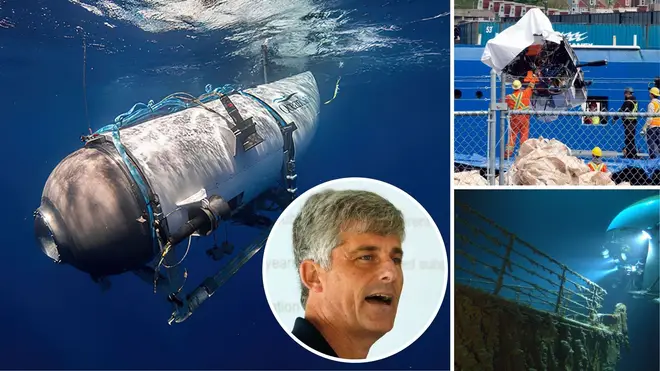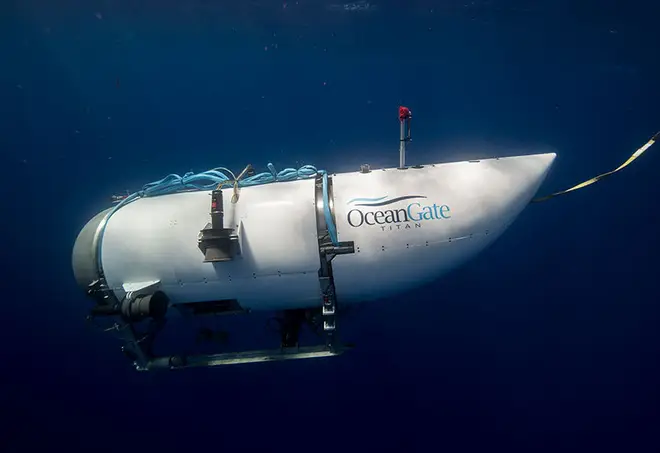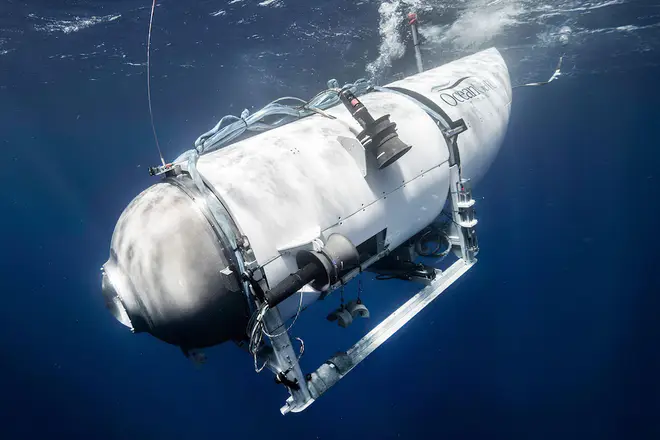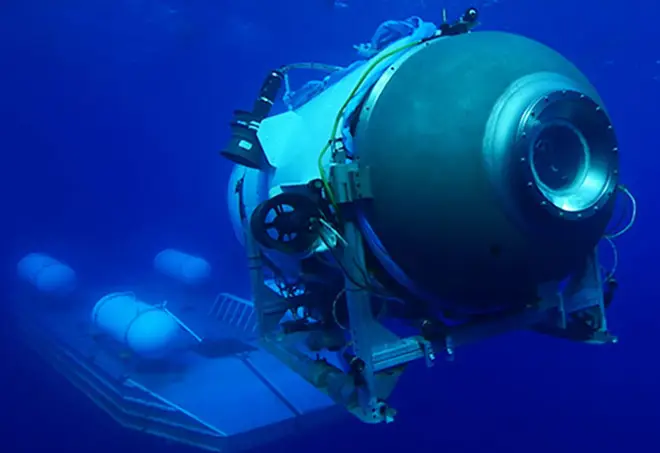
Matthew Wright 7am - 10am
29 February 2024, 13:20 | Updated: 29 February 2024, 13:22

Experts have revealed for the first time the theories surrounding the notorious banging noises heard by rescuers hunting for the doomed Titan submersible.
Oceangate CEO Stockton Rush, as well as UK billionaire Hamish Harding, French explorer Paul Henry Nargeolet, Pakistani businessman Shahzada Dawood and his son, Suleman, all died aboard the deep-sea exploration vessel after it disappeared in the Atlantic last June.
The group had been travelling 12,500 feet below sea level to the wreck of the Titanic in Oceangate's Titan vessel when the deep sea submersible catastrophically imploded.
The disappearance of the sub on June 18 sparked a huge rescue effort, and at one point banging sounds were heard by the people hunting for the sub - sparking faint hopes that the passengers could be saved.
Investigators believe the Titan imploded as it made its descent into the deep North Atlantic waters.
Now, the working theories conceived by experts hoping to find the group alive during the hunt have been revealed as a new tell-all documentary unearths the secrets of the deep-sea disaster.
The banging, which was first recorded on 20 June at around 11:30pm, was initially picked up by sonar equipment hunting for the group, with the sound registering in 30-minute intervals.
At the time, Wood Hole Oceanographic Institution's Carl Hartsfield told CBS News: "The ocean is a very complex place, obviously - human sounds, nature sounds, and it’s very difficult to discern what the sources of those noises are at times."
But now, experts have revealed a variety of reasons for the noises, including other vessels, the Titanic wreckage itself and passing whales.

At the time, this sparked hope that they could be an SOS message being banged out by the five passengers onboard.
Former Navy submarine captain Ryan Ramsey told the documentary makers: "It could be somebody knocking, the symmetry between those knockings is very unusual.
"It's rhythmic, it's like somebody is making that sound, and the fact that it is repeated is really unusual."
The intermittent banging heard coming from the ocean was initially thought to be a potential sign of life, with founder of maritime search and rescue organisation Marsar International, Matthew Schanck, revealing "subsurface of the ocean is a noisy environment,"
He adds that he suspects the noises most likely came from a nearby vessel - possibly a search boat, according to The Mail Online.
He adds: "Given the high density of vessels in the area operating their propulsion systems and heavy machinery/equipment in the area, this may have been picked up by sonobuoys."
Schanack reveals the noises could have been emitted from nearby search vessels, including the remotely operated Polar Prince, a Canadian Coast Guard icebreaker searching for the ship.
Dr Michael Guillen explained of the underwater craft: "You communicate from a submersible like that with the mother ship, with the research ship, through hydrophones.
"Electromagnetic waves, radio waves, don’t communicate well in the ocean because it’s salty, it’s ionic."
Schanck explained that "loose metal moving around" the wreck of the Titanic could be to blame for the noises or the imploded sub itself.
He later told Insider: "The banging could be something as simple as a piece of that moving in the current or something to do with the wreck itself."
It comes as Professor Emeritus of Earth and Environmental Sciences at Syracuse University, Jeff Karson, explained that the sound could be the result of a "complicated echo" which was "bouncing off a bunch of things" beneath the surface of the water.
"It’s like, you know, dropping up a marble into a tin can. It’s rattling around and that would confuse the location," he added.
Meanwhile, Dr Michael Guillen, a scientist who visited the Titanic wreck some 23 years ago, noted that the debris colliding with the vessel could be the cause.
He added that his own vessel got stuck in one of the Titanic’s large propellors during the visit.

Titan Sub documentary reveals banging was heard in audio near time of incident
Despite most theorists believing the even bangs, spaced 30-minute apart must come from a manmade craft, other don't discount marine life.
Many mammals - such as dolphins and whales - are known to make regular clicking sounds as part of their efforts to navigate the world's oceans.
Stefan B. Williams, Professor of marine robotics at the University of Sydney, believes marine wildlife such as whales could will have been to blame for the banging sounds.
Mechanical noise has also been blamed for the bangs, given the regularity of the sounds.
Chris Parry added that there is "a lot of mechanical noise in the ocean" which is teaming with other submersibles, ships, buoys and surveillance equipment.
He adds: "Trying to differentiate it from tapping noises is a fool’s errand."

The banging noises, which came at 30-minute intervals, were picked up on sonar by a Canadian aircraft in the Atlantic.
Now they have been played for the first time in a new documentary, and have a hollow, regular beat.
The cause of the noises was disputed during the rescue effort, with some experts claiming it was probably caused by sea debris, rather than the desperate passengers.
Coast Guard Captain Jamie Frederick said at the time: "With respect to the noises, specifically, we don't know what they are, to be frank with you."

The documentary, Minute by Minute: The Titan Sub Disaster investigates the events leading up to the expedition. It will air on Channel 5 on March 6 and 7.
Crews spent five days hunting the missing sub down before they discovered debris on the ocean floor near the wreck of the Titanic. Passengers had paid £250,000 a head.
OceanGate CEO Stockton Rush had claimed that the trip was "safer than crossing the street", with his company coming under fire following the incident for their experimental engineering techniques.
Addressing the banging noises, an internal US government email read: "RCC Halifax launched a P8, Poseidon, which has underwater detection capabilities from the air."

"The PH deployed sonobuoys, which reported a contact in a position close to the distress position. The P8 heard banging sounds in the area every 30 minutes.
"Four hours later additional sonar was deployed and banging was still heard."
But the US Coast Guard said after an "attempt to explore the origin of the noises... searches have yielded negative results but continue".
It was reported last year that US authorities are investigating people involved in the Titanic sub, with a view to possibly filing criminal charges.
OceanGate has since gone out of business.
Channel 5 / ITN Productions / The Titan Sub Disaster: Minute by Minute